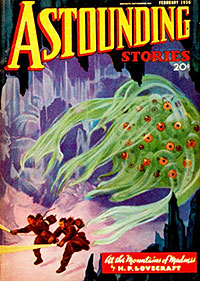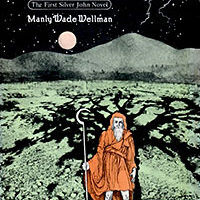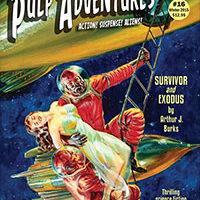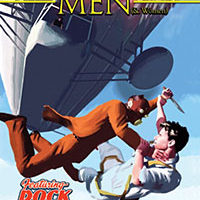
As has too often been the case, many pulp writers were ignored or overlooked during their lifetimes, only to become massively popular and well read after their demise. An example of this is Howard Philips Lovecraft (1890-1937) who toiled in relative obscurity writing for the pulps. Fortunately one fan worked to make his writings available, and now his works are widely known.
Lovecraft has influenced several generations of horror writers such that most recognize the term “Lovecraftian” to describe similar works or have heard of the “Cthulhu Mythos.”
As a young science-fiction fan I often also watched horror movies, many times because those horror movies were science-fiction films to a degree, especially with the idea of “creature features.” I watched the Universal monster movies — featuring Dracula, Frankenstein, the Wolf Man, the Mummy, et al — and all the rest from the ’30s, ’40s, ’50s, and ’60s.
I wasn’t much a fan of horror fiction, by and large, and never a fan of blood and gore that too often was a big part of them. But I heard of Lovecraft early on, and I think my first introduction was in seeing a section of Lovecraft “monsters” in the first edition Dungeons & Dragon’s Monster Manual. I was intrigued by the idea of monsters being not supernatural creatures, but alien and extra-dimensional creatures.
It would be a little later before I read Lovecraft’s works. I learned about Arkham House, but couldn’t afford their hardback collections. Then Del Rey Books came out with a six-volume (I think) collection of Lovecraft stories with interesting black, white, and red covers by Michael Whelan. I later worked out that some stories were missing, and those came in a trade paperback they put out a little later. Then I got collections of his revisions and the works by August Derleth. Much later I got into other Lovecraft influenced writers.
But who was H.P. Lovecraft, and what did he write?
Lovecraft was born in Providence, R.I., where he lived most of his life. His family had been well off, but fell on hard times. His father was committed to an insane asylum, and Lovecraft lived with his spinster aunts for most of his life. He was a poet, author, and amateur scientist from a young age, and turned to writing as a way to earn money, also revising the works of others. Most of his writing appeared in Weird Tales.
His works where an interesting mix. He didn’t make use of traditional horror creatures. Some stories were in his “Dreamland” cycle of stories. Others would be labeled by Derleth as part of the “Cthulhu Mythos.” These told of a group of beings, extra-dimensional and extra-terrestrial, who wish to “break through” and take back the Earth. Various people worship these creatures and wish to help this. Often times the “hero” of the story stumbles upon this and is able to stop things (or slow them down), though sometimes at the loss of his sanity or life.
Lovecraft also dabbled in poetry. Another element I liked was his use of local lore and ideas. There was an element of an ancient, hidden lore, and history of the world that most did not know of, of ancient races that ruled this planet before the coming of man. And some of this were recorded in ancient works like the “Necronomicon” and others.
 It was also interesting that through his extensive letter writing with other authors that they starting to make use of a sort of common set of themes and beings. Several added their own “creatures” to the mix, or their own forbidden volumes of occult lore. This is a concept that still exists today.
It was also interesting that through his extensive letter writing with other authors that they starting to make use of a sort of common set of themes and beings. Several added their own “creatures” to the mix, or their own forbidden volumes of occult lore. This is a concept that still exists today.
Several of his longer works are well known. “At the Mountains of Madness” tells of an expedition to Antarctica (mounted by Lovecraft’s fictional Miskatonic University in Arkham, Mass.). There the explorers find an ancient, pre-human city inhabited by creatures created by aliens millions of years ago.
In “The Shadows Out of Time,” a professor at Miskatonic starts acting strange. When he comes around several months later, he reveals that his mind had been taken over by a member of the Great Race of Yith, an ancient non-human race of beings who existed millions of years in the past who plan on projecting their minds into the distant future to another race and take them over to avoid catastrophe. In finding out if he just imagined it all, he mounts an expedition to Australia and discovers their ancient city and the writings he left while inhabiting a body of the Great Race!
There is “The Shadow Over Innsmouth,” set in another fictitious village in Massachusetts devoted to fishing, that has gone into worshiping Dagon and maybe intermarrying with fishmen (fishwomen?).
Lovecraft has had a big influence since his passing. Other authors have written works influenced by Lovecraft, works that tie into the Cthulhu Mythos. Robert Price has edited several collections of such books, as has publisher Chaosium. There have been some comic books, movies, radio dramas, and even card games, board games, and role-playing games. Chaosium’s Call of Cthulhu game is the most well-known of these. There are also fanzines devoted to just Lovecraft and related, such as the long-running Crypt of Cthulhu from Price and others, and other zines.
Editor S.T. Joshi has done extensive work on Lovecraft, putting out the definitive biography of Lovecraft. He has also edited the definitive editions of Lovecraft that first appeared in hardcopy editions from Arkham House and which now make up the paperback collections from Del Rey.
Arkham House editions:
- “At the Mountains of Madness, and Other Macabre Tales”
- “The Dunwich Horror and Others”
- “Dagon and Other Macabre Tales”
- “The Horror in the Museum, and Other Revisions”
Del Rey editions:
- “Dreams of Terror and Death: The Dream Cycle of H.P. Lovecraft”
- “The Road to Madness: The Transition of H.P. Lovecraft”
- “The Best of H.P. Lovecraft: Bloodcurdling Tales of Horror and the Macabre”
- “Tales of the Cthulhu Mythos”
- “The Horror in the Museum” (Lovecraft’s revisions)
- “The Watchers Out of Time” (Lovecraft & Derleth)
There are also a volumes from Knickerbocker that has the Complete Fiction in one volume, but there may be problems with blank pages in some copies. Tho the hardback volumes from Barnes & Noble is pretty good. Hippocampus Press has put out a 3 volume Valorium set with a fourth with his revisions coming soon.
If you haven’t read Lovecraft, you should check him out. He is not your standard horror author, and his influence alone is a reason to check him out.
UPDATED



